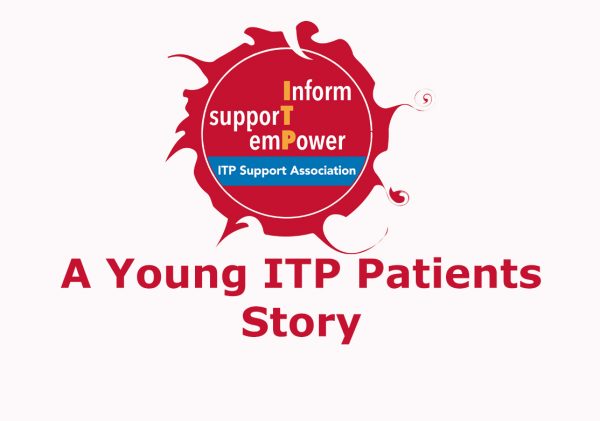No products in the cart.

Having ITP has saved my life – By Pam Brookes
Having ITP has saved my life.
By Pam Brookes
I know, it sounds ridiculous doesn’t it, but it’s true!
I was almost 57 and according to my husband, I was a few years into my menopause when I was diagnosed with ITP in May 2017. Sorry chaps, it’s one of those stories but please stick with it.
I had been to the doctors earlier in the year because I just felt so tired. I was crying at nothing and was exhausted all the time. My Doctor started a series of tests which all came back normal, reassuring but frustrating. Then I had a blood test as part of a starved glucose test. A Doctor phoned me later that day and told me that my platelets were at 7, and I must go to A&E, they were expecting me and to take an overnight bag. At the hospital the Doctor tried to explain what 7 meant, told me that I didn’t need to stay in and made me an appointment for the Haematology clinic.
Three day later, I was told I had ITP. What? Never heard of it. We had a long chat and I was given some reading material. It sort of made sense, the fatigue, the exhaustion but I only had one bruise, although it was odd to bruise from carrying a shopping bag with a loaf in it.
I started where everyone starts, steroids, 70 mg. I piled on so much weight but at least they were working. However, my platelets kept crashing down into single figures every time the dosage was reduced. By the November it was decided that I would start Romiplostim. Because of my weight, I had 5 injections every Friday. It was less painful to give myself 5 injections rather than having them all in one syringe. The injections worked initially but then I dropped back into single figures. Eltrombopag next. Again, it worked initially but then back down to 7 so back to the injections. I did have the odd week over 100 but mostly I was below 30.
It was now June 18 and I was bouncing along in single figures. That was when the operation to remove my spleen was first mentioned as the drugs just weren’t getting my numbers up to anything near a safe level.
By now I was getting blood blisters in my mouth and my gums bleed profusely when I brushed my teeth. It was frightening to wake up in the night with a mouth full of blood. I was told to be very careful, not to do anything risky, nothing that might result in a bruise, no stepladders to change lightbulbs, soft toothbrush in the morning and only mouthwash at night and no holidays abroad.
At my weekly Haematology appointments, the nurses always asked if I had any unusual bleeding. I didn’t mention it for weeks. But then, one week I decided I would mention it, deep breath, “YES” I said, “there is something, I have been having a light period for about 6 weeks but I think it’s my menopause”. She wasn’t convinced and fetched the Sister who asked me a few questions and advised me to talk to my doctor.
I wasn’t overly concerned because I was sure it was just my menopause but I talked to my doctor at my regular appointment a couple of weeks later.
My doctor made an urgent refer to Gynaecology. I had an ultrasound scan and saw the consultant a week later for the result. He told me that there was something on the scan that needed to be investigated and wanted me to sign the papers to have a biopsy taken. I asked him to talk to Haematology about it. Haematology said I couldn’t have the biopsy until my platelets were at a safe level, so it would have to wait.
As I was close to having my spleen out we all agreed that I would have both procedures done at the same time.
I was now having Rituximab infusions, sometimes into my wrist because the veins in the back of my hands were mostly being difficult. My platelets were fluctuating between 0 and 30.
Pre op infusion meds and injections happened in a blur of appointments and my platelets were over 100 a couple of days before the operation.
I have to admit that the operation, or rather the not waking up afterwards had been terrifying me for a few weeks, irrational I know! I kept telling myself that they wouldn’t do the operation unless they were confident that it was safe to do it, that it was their day job, that they didn’t want the bad statistics, that I was being stupid. I was still terrified.
October 18th, operation day, at the hospital for 7am. The plan for the day was:
1- blood test to check my platelet level,
2- Anaesthesia,
3- Biopsy,
4- Splenectomy,
Easy? …..No, my platelets had dropped to 30 so I was no longer first on the list. Platelets were requested from the blood bank and I had to wait until they were ready. Meanwhile, I saw a team of people for each element and was reassured by their calm, professionalism. But it was a very long morning.
What had I been worrying for? The anaesthetist was wonderful, the radio was on as I drifted to sleep and a lovely nurse was at my side smiling at me as I awoke on the other side of the keyhole surgery.
After 5 days in hospital my platelets were at 266 and I had no bleeding. Two weeks later, my staples were taken out and the scars were very tidy. All good.
Not quite! I still had the appointment to get the biopsy results. As I sat there with my husband, the Doctor calmly told me I had Stage One, Endometrial Cancer and I was to have a total Hysterectomy in the next couple of weeks. Not the menopause then… Cancer, I didn’t see that coming. We walked back to the car in shock. There were tears mixed with a few swear words as I buried my face in his shoulder. But not for long. We knew about it, there was a plan to get rid of it.
I had my Hysterectomy on 23rd November, another keyhole op. We joked that my belly was beginning to look like a dot to dot book.
Two weeks later my specialist nurse phoned. She told me that the cancer had been caught very early, was contained and more importantly I was in the clear. Merry Christmas.
My cancer was in a bucket.
So you see, ITP has saved my life.
If my platelets hadn’t been in single figures, I wouldn’t have had the bleeding. I know that, because after my Splenectomy when my platelets were normal, the bleeding stopped. The cancer would have developed and I wouldn’t have known a thing. And it wouldn’t have shown on a smear test until it was stage 3 or 4.
I have been very lucky, I know that. But please let my story be a warning to you. Don’t assume that your symptoms are just this or that. Having ITP doesn’t mean that everything else is OK.
Please, please, please, go and get those other symptoms checked, it could just save your life.
Pam Brookes



